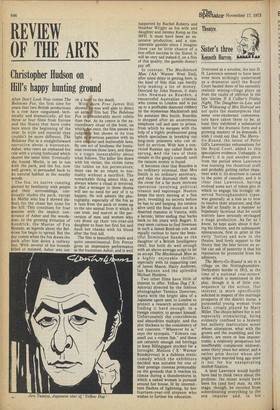REVIEW OF THE ARTS
Christopher Hudson on Hill's happy hunting ground
After Don't Look Now comes The 13elstone Fox, the first time for years that two British productions in a row have outgunned, technically and dramatically, all but three or four films from Europe and the States that have come here since the beginning of the year. In style and material they couldn't be more different. The Belstone Fox is a straightforward narrative about a huntsman, Asher, who rears an orphaned fox cub with a young foxhound which shared the same litter. Eventually the hound, Merlin, is set to run With the pack, and the fox, now well grown, is persuaded back to its natural habitat in the nearby Woods.
The fox, its native cunning abetted by familiarity with people and their surroundings, coniinually eludes the pack, except for Merlin who has a shrewd instinct for the chase but none for the kill. This continues for four 4easons with the implicit conrjivance of Asher and the woodsman, to the growing irritation of Kendrick, the Master of Fox Rounds, as legends about the Belatone fox begin to spread. But the day comes when the fox draws the Pack after him down a railway Line. With several of his hounds killed or maimed, Asher sets out on a huAt to the death.
WitOtlaorn Free James Hill showeehe was well able to direct an anirpl film but The Belstone Fox is ittinsiderably more subtle than that. At its centre is the extraordinary ritual of,the hunt, on
whic r once, the film passes no judg but shows in its true light a -serious pastime with its own si lar and inalienable laws. By one act of kindness the huntsman reverses these laws, and there is a tragic inexorability about what follows. The killer lies down with his victim; the victim turns the tables on his persecutors; there can be no return to normality without a sacrifice. The remarkable thing about this, as always where a ritual is involved, is that a stranger to these shores will see no need for any of it to happen. He will admire the photography, especially of the fox as it runs from the pack or noses up to the one animal from it which it can trust, and marvel at the perversion of men and women who can dress up their ten-year-old daughter to hunt her first fox and daub her cheeks with its blood after the first kill.
The film is beautifully made and quite unsentimental. Eric Porter gives an impressive performance as the huntsman Asher, and is well. supported by Rachel Roberts and Heather Wright as his wife and daughter and Jeremy Kemp as the MFH. It must have been an expensive production, and a considerable gamble since I imagine there can be little chance of a box-office success in the States. It will be very sad indeed if, on a film of this quality, the gamble doesn't pay off.
In contrast, The Mackintosh Man ('AA' Warner West End), after some delay in getting here, is the kind of film that can hardly help making a lot of money. Directed by John Huston, it stars John Newman as Rearden, a resourceful Australian criminal who comes to London and is put up to a profitable diamond robbery by the mysterious Mackintosh and his assistant Mrs Smith. Rearden is shopped after an anonymous telephone call and sent to prison, from which he escapes with the help of a highly professional gang which specialises in breaking out long-term prisoners who can afford its services. With him a convicted Russian spy called Slade is sprung, n d the two of them remain in the gang's custody until the ransom money is found.
It becomes clear that Rearden is no ordinary criminal, that Mrs Smith is no ordinary secretary, and that the diamond theft was the cover for a far more intricate operation involving political treason and espionage. Huston keeps the story moving at a fine pace, revealing no secrets before he has to and keeping the tension alive until the final shoot-out in a deserted mansion in Valetta, with a laconic, bitter ending that harks back to his years with Bogart. It may seem curious to find Newman in such a James Bond-ish role, and equally curious to have the beautiful Dominique Sanda as the daughter of a British Intelligence chief, but both do well enough with an above-average script to let us accept The Mackintosh Man as a highly enjoyable thriller, especially with its supporting cast of James Mason, Harry Andrews, Ian Bannen and the splendid Michael Hordern.
Two other films have little of interest to offer. Yellow Dog (' X ' Astoria) directed by the fashion .photographer Terence Donovan, starts with the bright idea of a Japanese agent sent to London to protect a research scientist and finding it hard enough, in a foreign country, to protect himself, Unfortunately the coincidences and absurdities multiply, and the plot thickens to the consistency of wet concrete. "Wherever he is," says the synopsis, " Kimura can smell out a rotten fish," and there are certainly enough red herrings to keep Billingsgate stocked for a fortnight. Malizia (' X' Warner Rendezvous) is a dubious erotic comedy which the exhibitors decided was suitable for one of their prestige cinemas presumably on the grounds that it reaches its climax during a thunderstorm in which a naked woman is pursued around her house, lit by intermittent flashes of lightning, by her fourteen-year-old stepson who wishes to further his education.


































 Previous page
Previous page